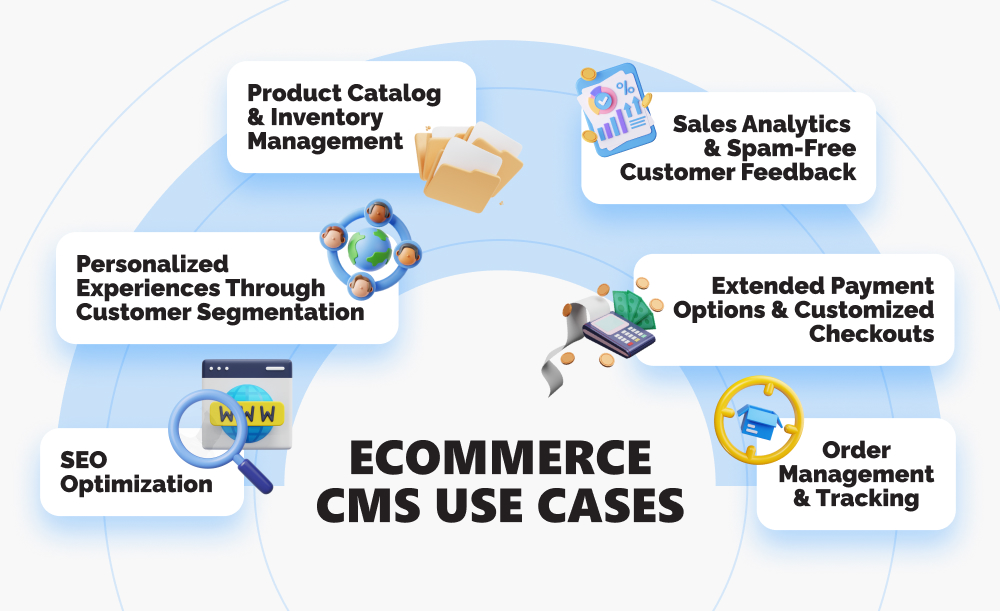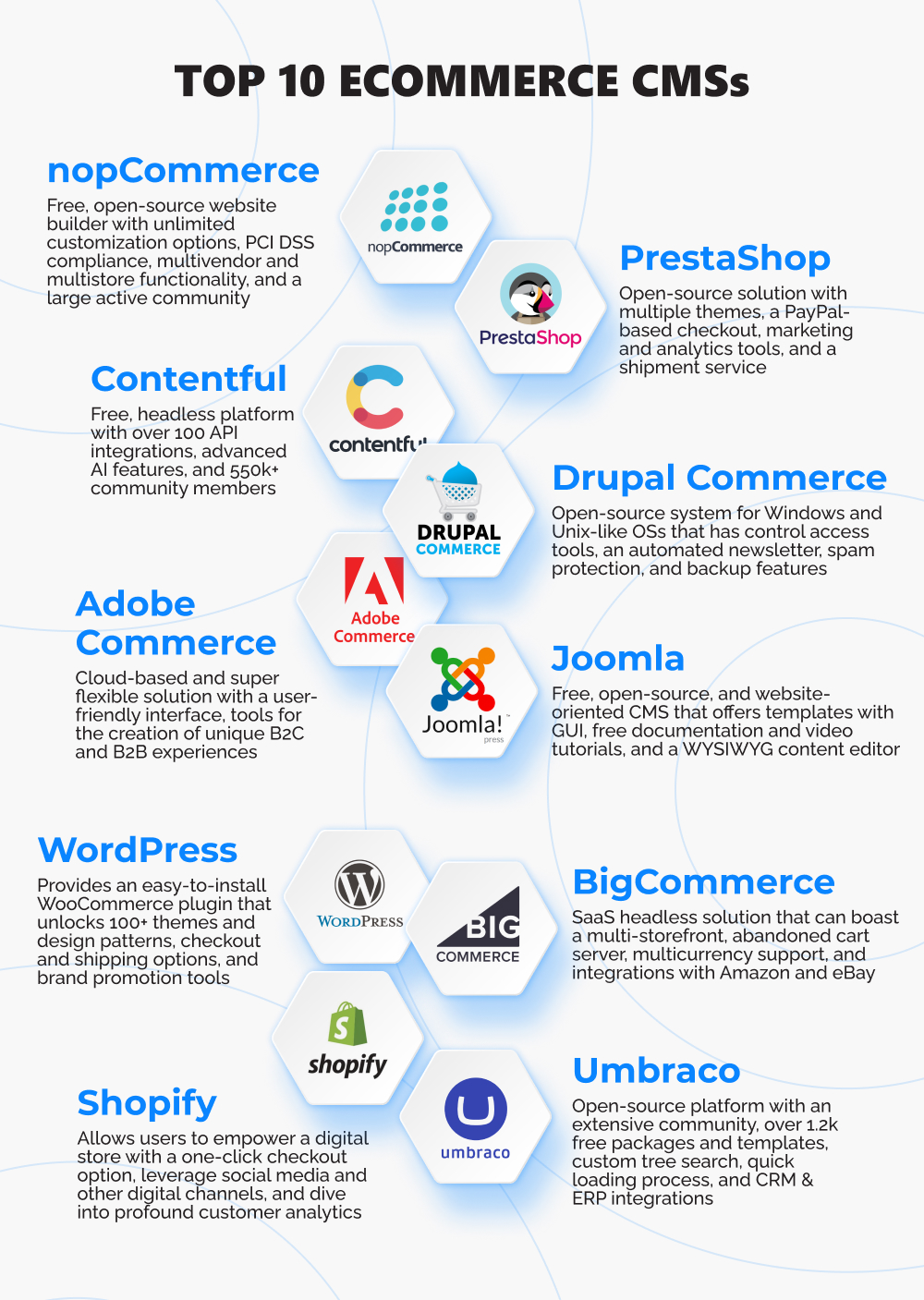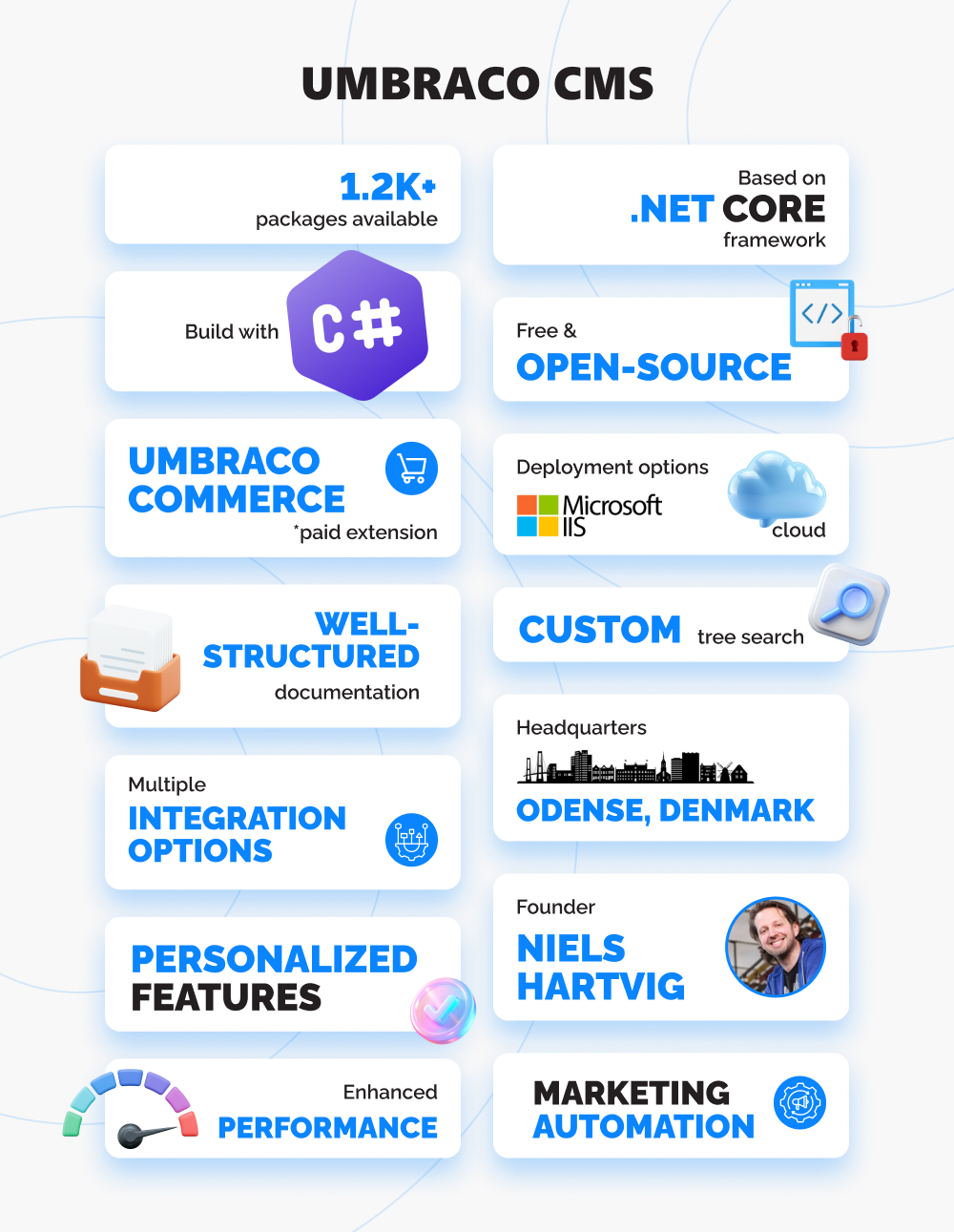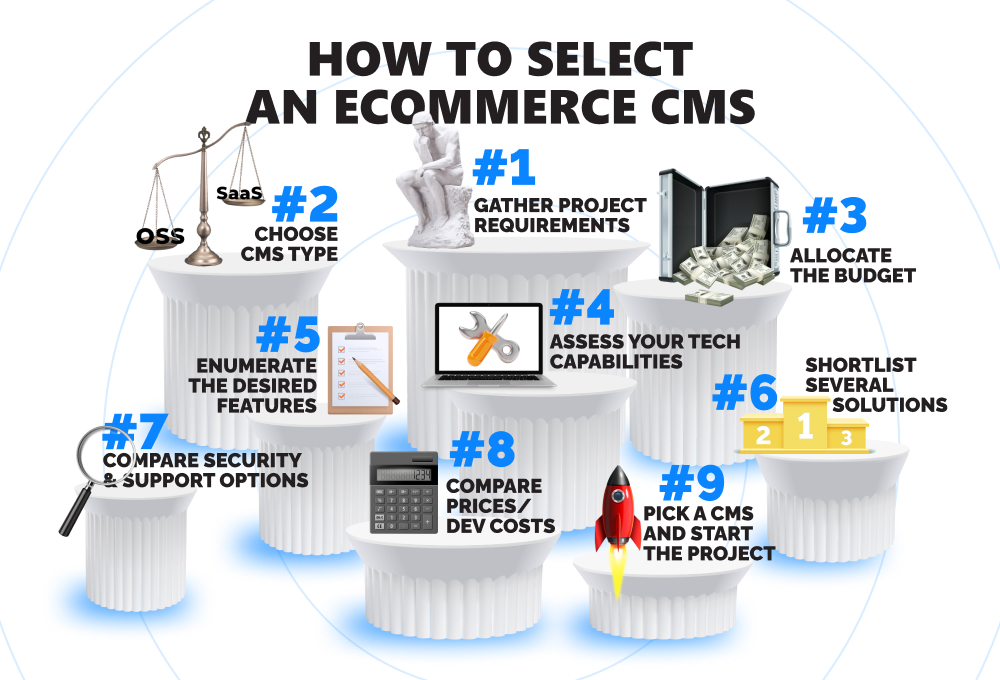While marketplaces and online shops spring up like mushrooms, we will hardly shock you by saying that 34% of people resort to digital stores at least once a week to satisfy ongoing customer needs. But the trend grows exponentially. Thus, why not ride the wave of the ecommerce boom and launch a digital sales channel (if you haven't done it yet) or upgrade the existing website to get the most out of it?
Whichever endeavor you choose, a user-friendly ecommerce CMS is a must. To help you pick the right tool for your online business, we've prepared an all-encompassing guide. Let's dive into it!
written by:
Kristina Prokopovich
Project Coordinator
While marketplaces and online shops spring up like mushrooms, we will hardly shock you by saying that 34% of people resort to digital stores at least once a week to satisfy ongoing customer needs. But the trend grows exponentially. Thus, why not ride the wave of the ecommerce boom and launch a digital sales channel (if you haven't done it yet) or upgrade the existing website to get the most out of it?
Contents
What Are Ecommerce CMS Platforms?
Our reality keeps digitalizing daily with the never-ending advent of new technologies and internet-based activities. We work remotely, do sports without leaving home, communicate with friends and colleagues on social media, watch movies and series at our “Netflix cinemas”, get food & grocery delivery in double-click time, and of course, we shop online, and we do it a lot.
The latter statement is also proved by the statistics revealing that global retail ecommerce sales will likely surpass $4 trillion this year. Pretty impressive, huh?
Considering this, it becomes clear why sellers get left out of the competition quicker if a user cannot find the traces of their stores in the vast reaches of the internet.
On the bright side, the wheel of progress keeps turning, bringing in fresh selling opportunities. It means there is no better time than today to join the ecommerce game and gain a foothold in the market. Even without needing extensive technical knowledge or heavy investments.
Definitions
Yes, you've heard us, this is possible. One of the ways to reach such an outcome is to select a CMS for ecommerce wisely, so let's find out what stays behind the concept.
A content management system (CMS) is software designed to simplify the creation and management of website content. By viewing a webpage as a set of blocks, such systems allow users to modify any piece of content without coding or designing elements from scratch.
This revolutionary approach to website management came into life in the late 1990s through the emergence of the Document Object Model (DOM) — a programming API capable of dividing HTML and XML document types into constituents and treating them independently.
But what are ecommerce CMS systems? These are even more advanced solutions that join conventional CMSs together with the selling features of an ecommerce platform. By integrating such tools into their business model, online stores can boost digital presence, drive organic traffic more effectively, and build customer loyalty.
Use Cases
How exactly can you leverage the combination of CMS and ecommerce platforms for the good of your business?
For starters, you can optimize product management and catalog handling. Just imagine: no more manual uploads of colors, models, and sizes for the tons of your goods, but an automated product categorizing instead. Secondly, a properly chosen CMS/ecommerce solution is an indispensable tool for raising brand awareness through the creation of SEO-friendly product descriptions and search engine rankings enhancement. Thirdly, such systems allow ecommerce store owners to embed payment gateways adjusted to the customer's location and preferences, and in this way build better checkout experiences. Last but not least: with an ecommerce CMS platform, it becomes possible to get spam-free customer reviews timely and tailor your online store to client expectations.
Key Features
The selection of ecommerce content management systems may strike even a sophisticated user's imagination, as each solution tries to stand out by offering distinctive functionality. Nevertheless, when choosing a CMS, first off take into consideration the availability of essential ecommerce features:
- User-friendliness (the best ecommerce CMS is the one that has an intuitive interface, smooth onboarding, and is easy to deal with, even for non-tech specialists);
- Scalability (at a certain stage, your business will inevitably need either scaling up or down, so make sure the ecommerce CMS solution you pick has the required flexibility and allows for smooth integration/disposal of third-party tools and handling the huge traffic volumes);
- Security (a stunning ecommerce website goes hand in hand with ultimate security mechanisms like PCI compliance, SSL, and data encryption);
- SEO features (a set of built-in SEO tools is a must for a CMS, as they help online businesses toy with keywords to satisfy search algorithms, create catchy meta descriptions, optimize page URLs, manage page titles, and much more);
- Customization and flexibility (numerous ecommerce software suppliers offer multiple languages, free and paid themes, custom drag-and-drop page builders, navigation menus and dashboards, and other structure elements for adjusting the solution's capabilities to current business needs);
- Seamless integration with third-party tools (it is also possible to enrich a CMS for ecommerce with advanced features like marketing automation and analytics, customer relationship management (CMR), payment processing, shipping, and inventory services by taking advantage of corresponding plugins and add-ons);
- Mobile responsiveness (the ability to transform a desktop web store into impeccably running mobile websites is paramount, as more and more users shop with smartphones, pushing forward the m-commerce industry).
Types of Ecommerce CMS Software
As you see, CMS ecommerce solutions cope with a plethora of tasks, saving time and money of forward-looking shop owners and powering them with stunning digital sales channels. However, it is crucial to assess your tech capabilities and requirements before integrating such a system into the ecommerce business model to minimize dev costs in the long run.
Lack technical expertise to make the decision? Check a brief overview of ecommerce CMS types.
Let's start with open-source software (OSS). These are licensed solutions that provide a codebase available for studying, using, modifying, and distributing. In other words, you may take an open-source ecommerce platform, analyze its components, and adjust it to your business needs or enrich it with the required ecommerce functionality. Such an approach presupposes extensive customization options through the sharing of multiple plugins and add-ons among a vast development community. At the same time, it requires certain tech knowledge and experience to manage code and security mechanisms properly.
If you are searching for a platform with simplified set-up and maintenance, go for a cloud-based solution (SaaS). In this case, a service provider will take the burden of tech and security tasks (most of them) off your shoulders. However, to take advantage of such hosting services, you will need to pay a subscription fee (monthly/yearly) and set up reliable backup mechanisms. Besides, the system's customization potential is limited in this case. Shopify is the most popular ecommerce CMS in this category.
Both SaaS and OSS solutions can be monolithic or headless. Traditional content management systems have a monolithic structure at the core, i.e., their frontend (interface) and backend (tech internal side) operate as a single unit. In a headless CMS, a frontend is separated from a backend, which brings in boosted scalability and accelerated deployment. Such systems serve as content repositories and can be connected to any digital channel via an API. On the other hand, they require a team of proficient web developers to run seamlessly in compliance with ever-changing updates and marketing requirements.
CMS Type
Concept
Pros
Cons
Examples
Open-source (OSS)
Licensed solutions with an open codebase that any developer can learn, use, modify, and share
- Diverse customization options
- Huge number of plugins and add-on features
- Vast development community
- Requires at least basic tech knowledge
- Security and management are the user’s responsibilities
Umbraco, WordPress/ WooCommerce, PrestaShop, Strapi, Drupal, Joomla, Magento Open Source, nopCommerce
Cloud-based (SaaS)
Platforms maintained and secured by third-party service providers that are available on a subscription basis
- Easy-to-use
- Service provider is in charge of development and maintenance
- Allows shop owners to focus on marketing strategy and product enhancement
- Limited customization options
- Requires monthly/yearly subscription fees
- Reliable backup mechanisms are needed
Shopify, Wix, BigCommerce, Contentful, Adobe Commerce, Umbraco Cloud
Headless
Software with separated back-end and front-end components, i.e., it runs without an inbuilt graphical UI
- Highly scalable and flexible
- Easily adjusted to desktops, mobile devices, and apps
- Skillful development team is a must
Strapi, Contentful, Umbraco Heartcore, Adobe Commerce, BigCommerce
Feel free to resort to our CMS development company for a more profound ecommerce CMS comparison. Our experts will assess your requirements and budget, define the right fit for your business model, and set up the system with an eye to further scaling and customization.
10 Most Popular CMSs for Ecommerce
Now that you know the basics, the time is ripe to handpick the best ecommerce CMS for your business. An expert comment on various platforms awaits you below.
#10. PrestaShop
Known as a "freemium", open-source ecommerce solution, PrestaShop empowers its users with vast opportunities, like free themes, a PayPal-based checkout, marketing tools (Klaviyo), PrestaShop Metrics for thorough analytics, and an inbuilt shipment service (eShip). If you go further and try a paid version, you will get access to automated VAT calculation tools, cookie management, and help with the migration of existing ecommerce websites to PrestaShop. However, since it is an open-source platform, tech expertise in ecommerce site hosting is required.
#9. nopCommerce
Developed with Microsoft's ASP.NET Core framework, this free, open-source website builder is renowned for unlimited customization options, PCI DSS compliance, a rich tool-set to optimize search engines, multivendor and multistore functionality, and a large active community. This option perfectly meets the needs of all walks of ecommerce business (fashion, health and beauty, automotive, food, industrial, and scientific). At the same time, it can be resource-heavy, especially as the store grows in size and complexity.
#8. Drupal Commerce
This free, open-source ecommerce CMS was released in 2001 for Windows and Unix-like operating systems. Built with JavaScript and PHP, it perfectly copes with any type of web content (multipage websites, blogs, online stores, forums, etc.). Among its features, you will find hundreds of pre-designed themes, a multifunctional block editor, control access tools, an automated newsletter, spam protection, backup and restore features, and DDoS and WAF protection.
#7. Contentful
The platform was launched in 2013 in Berlin as a headless CMS solution. At the moment, it can boast a composable structure with over 100 API integrations, advanced AI features, and 550k+ community members. No matter whether you are a content creator, developer, marketer, or editor, this CMS is easy to start for everyone. Moreover, if your team does not exceed 5 simultaneously working users, you won't have to pay anything for leveraging the platform's potential.
#6. Joomla
Joomla is one more CMS you may select for your ecommerce store. Devised with the PHP language by Open Source Matters, Joomla is considered one of the best ecommerce CMS platforms namely for its diverse functionality (multiple templates with GUI, free documentation and video tutorials, in-built tools for SEO-optimized content, over 70 translation packs, WYSIWYG content editor, simplified feed management, etc.). Besides, the system is free, open-source, and website-oriented.
#5. Adobe Commerce
Adobe Commerce is a hosted and super flexible solution with a user-friendly interface, tools for the creation of unique B2C and B2B experiences, rich autoscaling potential, and battle-tested security mechanisms. Also, the platform may offer AI-based features for building personalized customer journeys and assistance with management and support. Both the solution and its management services are available on a paid basis.
And one more fact you need to know. In 2018, Adobe acquired Magento — an open-source ecommerce platform. At the moment, the company offers the solution under the name Magento Open Source. It is free and has vast selling potential, but its marketing and SEO features are limited.
#4. BigCommerce
Meet another B2B ecommerce CMS — BigCommerce! Many users consider it the best ecommerce CMS for being agile, SEO-friendly, marketing-oriented, and highly secure. It is also a SaaS headless solution that offers custom pricing to each client in compliance with the required scalability and features. A multistorefront, abandoned cart server, support of different currencies, and integrations with sales channels like Amazon and eBay — these are just several out of many features the platform is proud of. What is more, it does not charge transaction fees, which makes it stand out among the other tools for businesses with large goods turnover.
#3. WordPress (WooCommerce)
No matter whether you want to start selling online, build a fully-fledged digital store, or power up the existing solution, WordPress has it all covered for you. This content management system offers an easy-to-install and highly customizable (on a no-code basis) WooCommerce plugin that simplifies online shop creation and management. Hundreds of themes and design patterns, multiple checkout and shipping options, tools for brand promotion and game-winning content marketing, and much more.
Already have a WordPress site? Simply integrate an open-source WooCommerce plugin into it — and you are all set!
#2. Shopify
If it is not the first day of your ecommerce business, you have likely heard of this eminent Canadian-based solution. The key reason why Shopify has won the hearts and minds of thousands of users around the globe is its impeccable combination of quality, available features, and pricing. For instance, with Shopify, you may easily launch a digital store to your taste and sell as many items as you want, empower it with a one-click checkout option, distribute the goods on social media, in marketplaces, through customer chat, and other digital channels, dive into profound customer analytics, get a unique domain, and leverage marketing automation. All these features (and not only) are available from $32 per month, which makes the platform the top choice for many undertakers.
#1. Umbraco
Being the icing on the cake on our rating list, Umbraco can be truly called the best CMS for an ecommerce website. Created with C# and .NET Core framework, the platform is deployed on a Microsoft IIS server or in a cloud (Azure, AWS). Although Umbraco is open-source and free by itself, Umbraco Commerce is its paid extension. The platform is user-oriented and provides detailed documentation so that anyone can easily put Umbraco through its paces. The list of its competitive edges embraces over 1.2k free packages and templates, marketing automation features, custom tree search, quick loading process even for high-traffic websites, and smooth integration with web analytics tools, CRM & ERP platforms, payment systems, and social media.
By the way, Vogue, Mercedes-Benz, the University of Oxford, and ecommerce industry players are already leveraging the solution. Wanna follow their lead and launch an appealing, multifunctional Umbraco-based website? Fall back on our Umbraco development services, and we will help you reach bold selling goals in a breeze.
How to Pick the Best CMS for Your Ecommerce Business?
Each ecommerce CMS is good at one point or another and provides a whole bunch of content and marketing tools. To save starting entrepreneurs from racking their brains, we have created a step-by-step guide on how to select a perfect match for an eCommerce business.
- Define your starting point, i.e., assess your selling line (how big and diverse is it?), decide on a digital product format (one-page/multipage website, catalog page, fully-fledged online store, or marketplace), design concept (customized template or from-scratch unique design), possible content strategy (whether you will need a blog, newsletter, social media presence or not), and gather other requirements vital for your project;
- Allocate the budget;
- Choose the CMS type (SaaS or OSS) in compliance with your budget, requirements, and development expertise;
- Evaluate your tech capabilities. If you have little experience with development and maintenance and are pressed for money, you'd better start with some ready-made SaaS solution, use inbuilt templates, and try to launch a basic website (with the perspective of further scaling and growth). In case you have a vast selection line, a huge customer pool, and resources for a tech project (or an in-house dev team), building a multipage online store with an open-source solution may be an option;
- Enumerate the features you'd like to have in your solution for now and in the long run;
- Analyze the above-mentioned rating list and write down the solutions capable of providing you with the desired functionality, bearing in mind the CMS type chosen at step#3 and available resources;
- Check the security mechanisms and support options provided by the shortlisted services;
- Compare the prices or development and maintenance costs;
- Choose the best ecommerce CMS and let the project begin!
Food for Thought
The exact future of a constantly evolving ecommerce field is hard to predict. But let's try to suggest what may affect ecommerce CMS solutions by analyzing current digital trends. The most obvious advancement is the further combination of m-commerce and AI/ML (considering all the buzz around artificial intelligence in content creation and already existing CMSs with inbuilt AI features). Augmented reality (AR) may also join the game with its ability to ensure virtual fitting-room experiences. As voice search and smart speakers are spreading, voice-friendly designs and functionalities may also appear in ecommerce solutions.
Whatever scenario will come to life, one thing is clear for now: people will keep buying stuff online, and the demand for m-commerce services is likely to gain momentum.
Want to upgrade your digital sales channel to build a memorable brand and extend the customer pool? Reach out to Qulix. Our specialists will analyze an ideal vision of your online store and help you turn it into reality within the shortest possible time.

Contacts
Feel free to get in touch with us! Use this contact form for an ASAP response.
Call us at +44 151 528 8015
E-mail us at request@qulix.com












